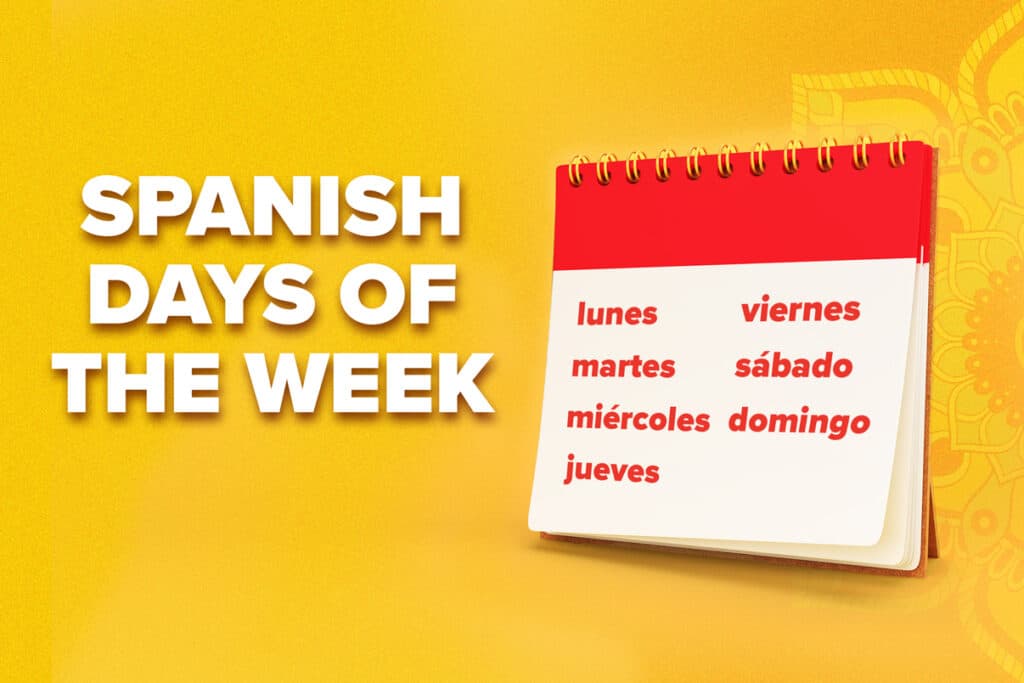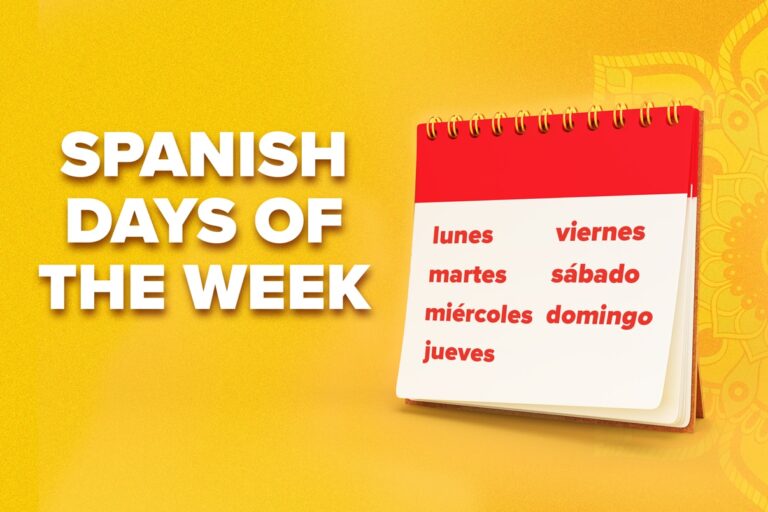
Know what seven of the most useful Spanish words you can learn are? The Spanish days of the week!
Learning these is an important step towards having a functional Spanish vocabulary.
In this post, you’ll learn the seven days of the week in Spanish, how to use them correctly in sentences, vocabulary to help you talk about the days and more.
Let’s get started!
Contents
Download:
This blog post is available as a convenient and portable PDF that you
can take anywhere.
Click here to get a copy. (Download)

Spanish Days of the Week
Most of the Spanish days of the week were named according to their original Greek or Roman names, which originated from spiritual figures.
You’ll see some Latin and Hebrew linguistic elements, too!
1. Lunes — Monday
Abbreviations: L, LU, or lun.
Origin: Luna (the moon)
2. Martes — Tuesday
Abbreviations: M, MA, or mar.
Origin: Marte (Roman god of war)
3. Miércoles — Wednesday
Abbreviations: X, MI, or miérc.
Origin: Mercurio (Roman god of commerce)
4. Jueves — Thursday
Abbreviations: J, JU, or juev.
Origin: Júpiter (Roman god of the sky)
5. Viernes — Friday
Abbreviations: V, VI, or vier.
Origin: Venus (Roman goddess of love)
6. Sábado — Saturday
Abbreviations: S, SA, or sáb.
Origin: Sabat (Hebrew word for “rest”)
7. Domingo — Sunday
Abbreviations: D, DO, or dom.
Origin: Dominus (Latin word for “Lord”)
How to Use the Spanish Days of the Week
Days of the week are not capitalized
In English, failing to capitalize the days of the week is a grammatical error. But in Spanish, the opposite is true—capitalizing is grammatically incorrect. The only exception is if they appear as the first word of a sentence.
All days of the week are masculine
In Spanish, all nouns have a gender (if you want a full post on Spanish gender, click here). This means the days of the week are gendered too, since they’re nouns.
Luckily, this is easy to remember because all days are masculine. This means that when referring to a day, you must use the masculine articles el, los, un and algunos.
“On [day]” doesn’t translate directly into Spanish
In English, we use the preposition “on” to talk about something happening on a specific day. Resist the urge to translate directly—in Spanish, you don’t need to insert the word en, or any other preposition, for that matter!
When talking about days of the week, use the pronouns el and los to mean “on.” Use el when talking about one single occurrence and the plural los when talking about something that happens habitually.
Viene a Madrid el lunes.
(She’s coming to Madrid on Monday.)
Trabaja todos los sábados.
(He works every Saturday.)
Only sábado and domingo change in plural form
Sometimes, you need to talk about days of the week in the plural, like in the previous example (“todos los sábados”).
When making days of the week plural, only add an –s if the word doesn’t already end in –s. In other words, only add -s to sábado and domingo. Otherwise, the word stays the same in the plural form. So, the plural forms of the days are:
Use ser with days of the week
When talking about which day of the week it is, you’ll always use ser instead of estar.
This might be confusing at first since estar is usually used when describing things that are transient, but with practice, you’ll get the hang of it. Take a look at some examples:
Hoy es martes. (Today is Tuesday.)
El juego es el miércoles. (The game is on Wednesday.)
Mi cumpleaños es el próximo viernes. (My birthday is next Friday.)
Useful Vocabulary for Talking About the Days of the Week
Now that you know the basics, here are some useful words and phrases you may want to use when discussing the week’s days.
| Spanish | English | Example |
|---|---|---|
| Hoy es.. | Today is… | Hoy es lunes. (Today is Monday.) |
| Mañana es… | Tomorrow is… | Mañana es martes. (Tomorrow is Tuesday.) |
| Ayer fue… | Yesterday was… | Ayer fue domingo. (Yesterday was Sunday.) |
| El día | The day | ¿Qué día es hoy? (What day is today?) |
| La fecha | The date | ¿Cuál es la fecha de hoy? (What is the date today?) |
| El próximo | Next | ¡El próximo lunes es mi cumpleaños! (Next Monday is my birthday!) |
| Que viene… | The upcoming… | Vamos a Barcelona el viernes que viene. (We’re going to Barcelona this upcoming Friday.) |
| Siguiente… | The folllowing… | No empieza el curso el próximo lunes, sino el lunes siguiente. (The class doesn’t begin next Monday, but rather, the following Monday.) |
| Pasado | Last | El sábado pasado, fuimos a la playa. (Last Saturday, we went to the beach.) |
| Anterior | Previous | No la vi el viernes pasado, sino el viernes anterior. (I didn’t see her last Friday, but rather, the previous Friday.) |
| Antier / Anteayer | The day before yesterday | Hoy es jueves, antier fue martes. (Today is Thursday, the day before yesterday was Tuesday.) |
| Pasado mañana | The day after tomorrow | Viene mañana, y pasado mañana se va. (He’s coming tomorrow, and the day after tomorrow he leaves.) |
| La semana | The week | Hay siete días en la semana. (There are seven days in a week.) |
| El fin de semana | The weekend | Este fin de semana voy a ver a mis amigas. (This weekend, I’m going to see my friends.) |
| Entre semana | Midweek | Viajo los fines de semana, pero me quedo en casa entre semana. (I travel on the weekends, but I stay at home during the week.) |
| Cada / Todos los… | Every | Cada jueves tengo clase de matemáticas./Tengo clase de matemáticas todos los jueves. (I have math class every Thursday.) |
| El primer… del mes | The first __ of the month | Hay una fiesta el primer sábado de junio. (There is a party on the first Saturday of June.) |
| De… a… | From __ to __ | Trabajo de lunes a viernes. (I work from Monday to Friday.) |
| Desde… hasta… | From __ to __ | Estaré en Santo Domingo desde el lunes hasta el sábado. (I’ll be in Santo Domingo from Monday until Saturday.) |
Tips for Practicing the Spanish Days of the Week
- Write the full date every day. Writing the full date daily will help you remember the words and their correct order.
- Use authentic media to learn. The immersive language learning program FluentU, for example, provides Spanish videos with interactive subtitles so you can learn the days of the week (plus other vocab and grammar) in authentic contexts.
- Make up an acronym. Use the first letter of each day and create your own acronym to help you remember them. For example: Little Mice Make Jolly Vikings Slam Doors. Yes, it’s silly, but that’s what makes it so memorable!
- Switch your phone to Spanish. Changing your settings to make your phone speak to you in Spanish can be a great way to practice your language skills passively throughout the day.
- Learn with a song. YouTube is chock-full of “days of the week” songs in Spanish. Here’s one, and here’s another for your listening pleasure.
Congratulations! You now have all the tools you need to talk about the Spanish days of the week.
You’ll be well on your way to having Spanish conversations in no time.
Download:
This blog post is available as a convenient and portable PDF that you
can take anywhere.
Click here to get a copy. (Download)



